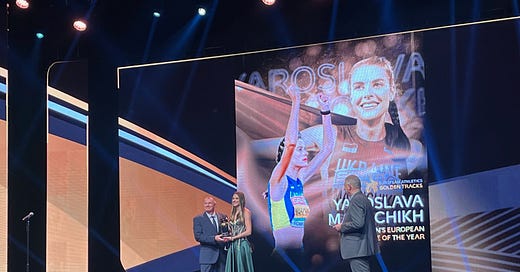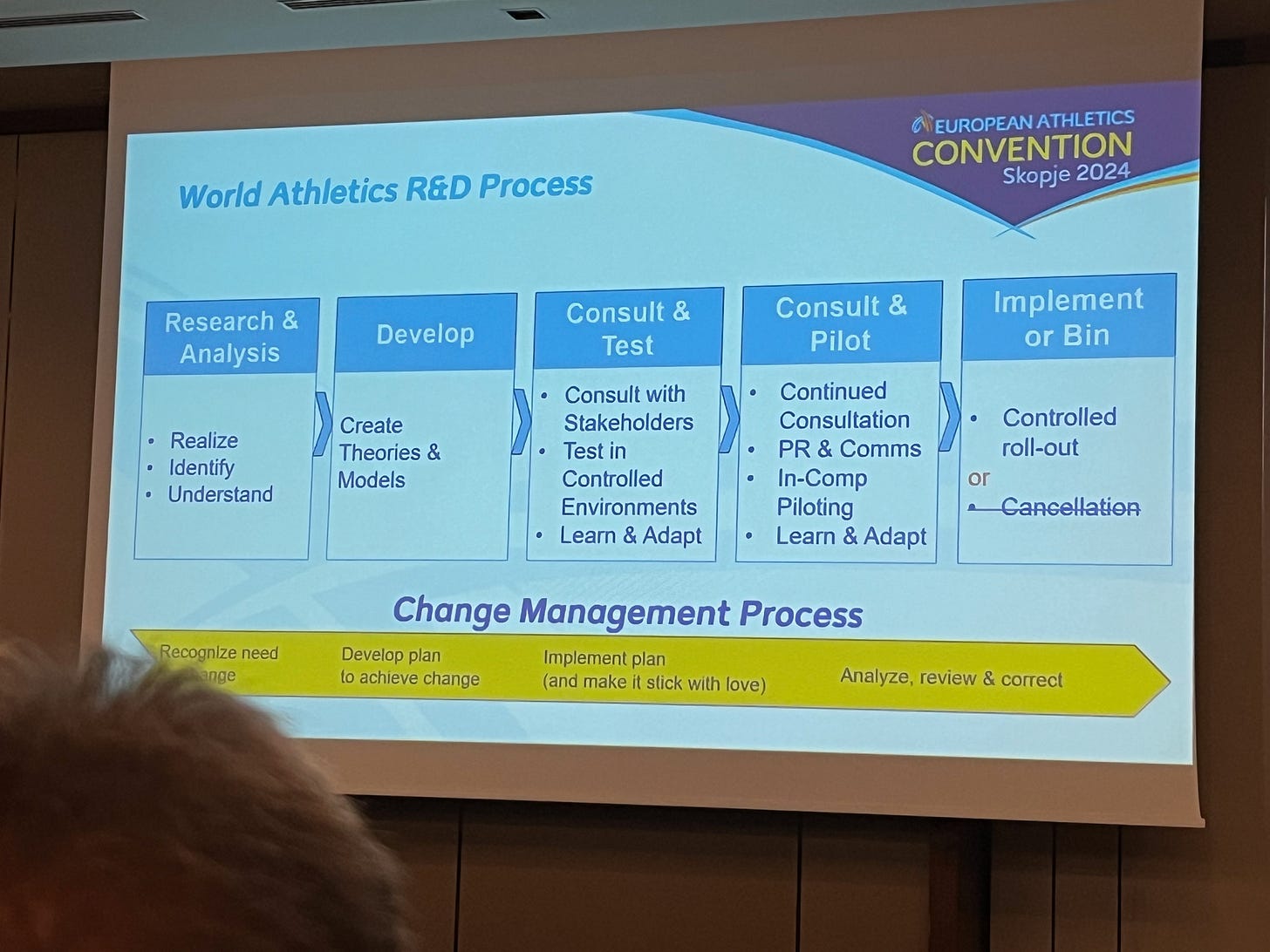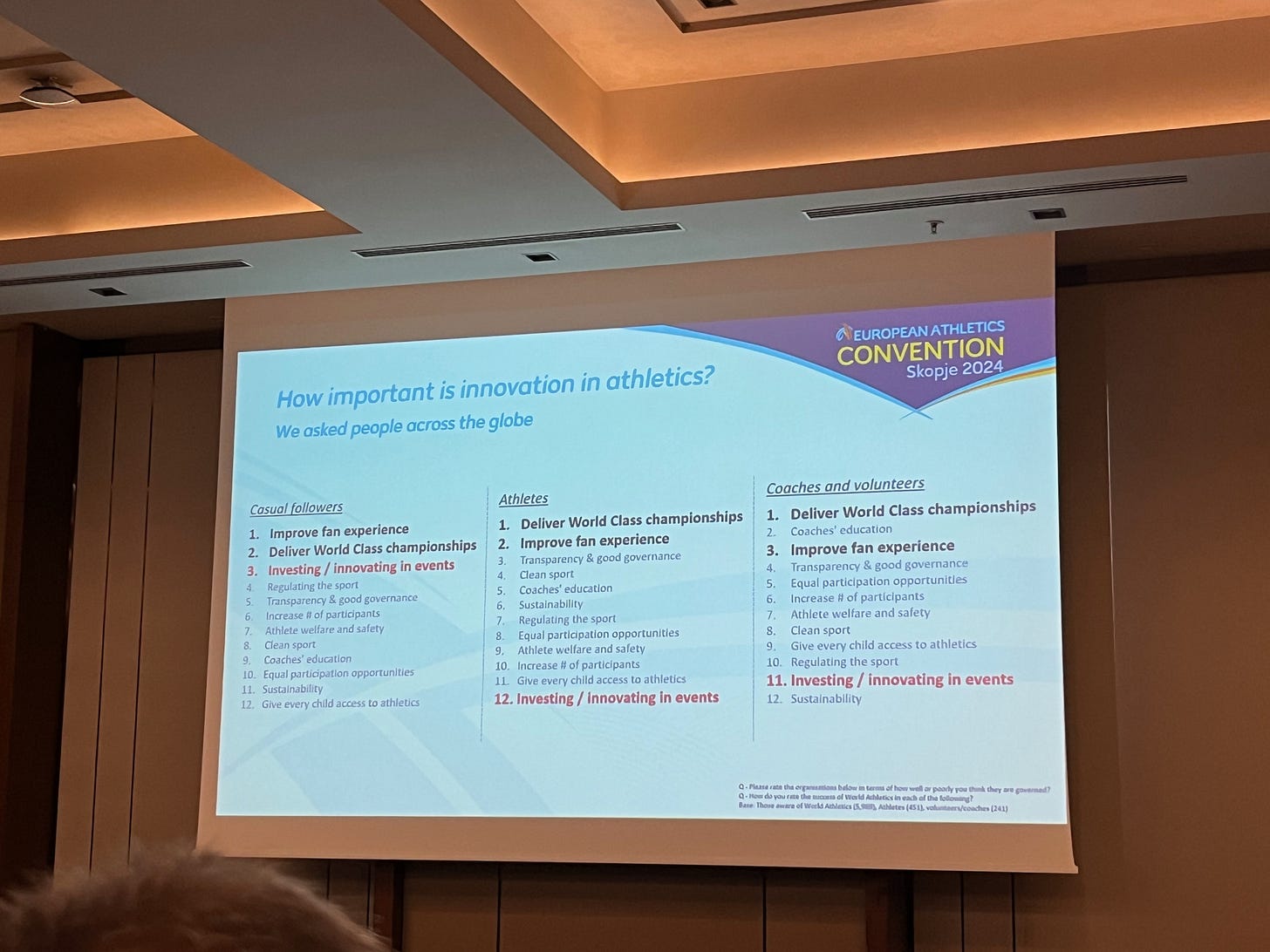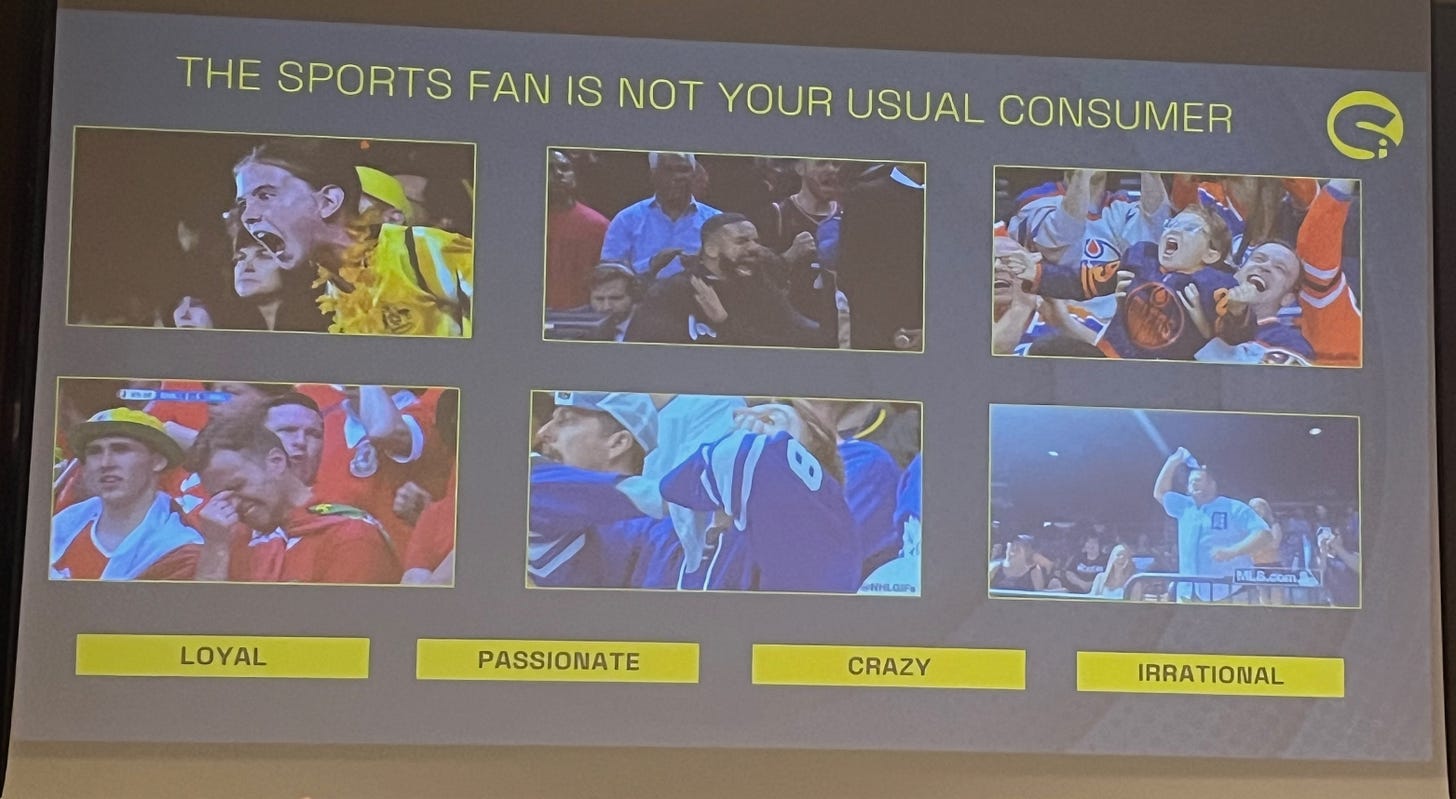OpenTrack at the European Athletics Convention and Gala
OpenTrack’s Managing Director Andy Robinson provides the inside track from the European Athletics Convention, looking to the future of the sport
We’ve just spent four days at the annual European Athletics Convention in Skopje, North Macedonia, where member federations, meeting organisers, and service providers gathered to discuss all aspects of the sport.
In this update:
Surveying Skopje
Athletes Still Running (the Sport)
New Tech on the Way
Reimagining Competition Delivery
Digitisation to Monetisation
Golden Tracks Gala Dinner
This update covers what’s coming soon to the cutting edge of athletics, and lifts the curtain on the Convention for those who couldn’t make it — plenty to write home about!
Surveying Skopje
Skopje has been beautifully redeveloped in the last 15 years, with a majestic modern square, imposing riverside and hundreds of statues. The 15th-century Stone Bridge leads over the river to the old Ottoman bazaar district. There’s plenty more to see, including the birth place of their Nobel prize winner, Mother Teresa; and as Brits we were surprised to see red double-decker buses1. Due to cultural disputes with neighbours, nobody’s supposed to say that the statues are of Alexander the Great and his dad, Philip II of Macedon.

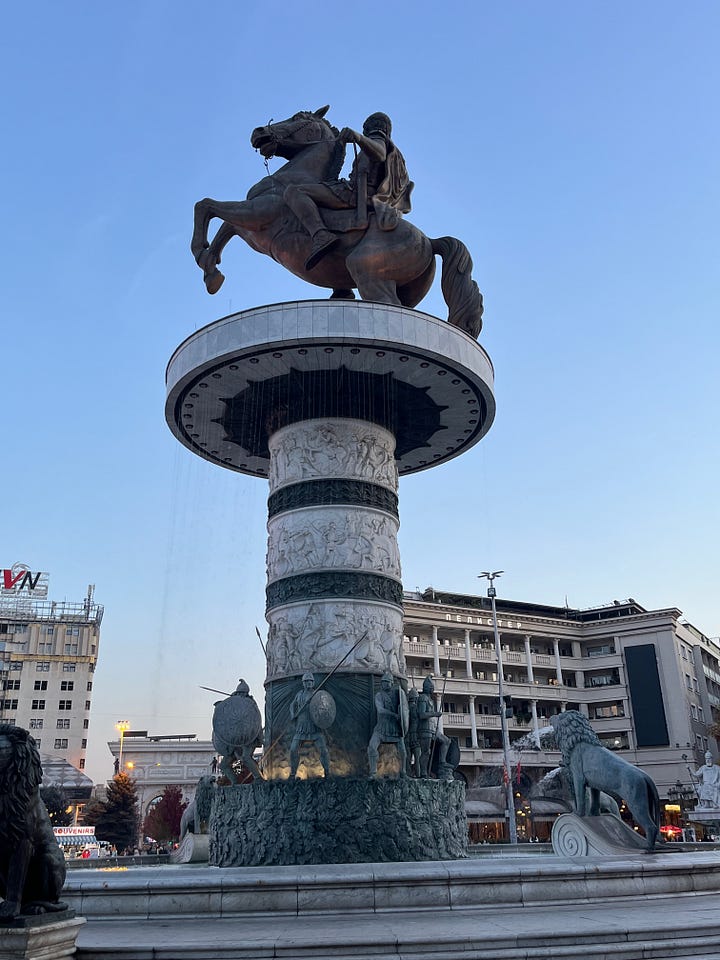


The city also takes sport seriously, with a cycling and running path alongside the river for many kilometres (the 4K to the convention hotel and back was well-trodden by delegates). Just upstream of the Stone Bridge is a huge city park with the national stadium, numerous playing fields, and other sports facilities.
North Macedonia, like most of its neighbouring countries, uses OpenTrack to manage all their competitions, so if anyone fancies a training camp location with a bit of tourism, or maybe to challenge the locals to a match, don’t hesitate to let us know!
Athletes Still Running (the Sport)
It’s great to see such a high percentage of federations run by people who have either competed, or given a lifetime of service to the sport.
As one tiny example, Jack Buckner and Stefano Mei, who went 1-2 at the 1986 European Championships, are now leading their respective countries’ federations. Buckner’s run set what is still the championship 5000 metres record of 13:10.15, and the pair were out together for a morning run on the Vardar river towpath. (Stefano later confessed, puffing on a large cigar, that Jack still has the edge!)
Sessions in the convention hotel gym can be quite intimidating, as you’re equally likely to see Robert Emmiyan (at 8.85, still the fourth-longest jumper of all time), EA President Dobromir Karamarinov, or World Athletics president Seb Coe getting in a workout before the talks start — and they’re all in great shape.
New Tech on the Way
One of the bigger innovations coming down the road is a new generation of position tracking devices. Already seen in this year’s Olympic marathon, we’ll soon begin to see Tour de France-type displays with who’s in the lead and chasing groups and how far back they are, using relatively light (50-140g) transponders worn by athletes.
Reimagining Competition Delivery
We had a great overview of World Athletics’ approach to changes in athletics in the future. They key takeaway is that they are ready to try ideas out, see how they work and how it grips audiences, and either ‘implement it or bin it’.
They are able to collect massive amounts of data now about what people are watching, or following on their second screens, and surveying both diehard athletics fans and occasional watchers to understand how the changes are working out.
The attendees then split into five groups to discuss how we could make events more engaging. Your correspondent was in a group studying cross-country led by Jakob Larsen, who put together the 2019 World XC in Aarhus, Denmark on a famously exciting course.
We started by brainstorming what excites fans — the long history, twisty challenging courses over varied terrain, and being in nature — and talked through possible new formats that would combine good TV access and storytelling while catering for the needed field sizes. There are many new ideas out there, including a 30K point-to-point cross race in Sweden, and even the possibility of short-course races with multiple rounds.
Digitisation to Monetisation
OpenTrack is proud to have helped lead conversations about digitisation in athletics over the last 7-8 years, having first met with EA in 2016, and planning the biannual AthTech conferences together. Most countries in Europe are well on the way to efficiency savings, delivering more competitions and a better experience for fans with less human effort.
A key topic this year was how to turn all the data generated into more income for the sport. EA brought top speakers from the likes of the BBC, and agencies who have represented other major sports and helped them to earn money in the digital realm.
Our key takeaway is that we need to move from list-and-search displays of competition results to having engaging sites which automatically use rules (and maybe even some light Artificial Intelligence, the buzzword of the year) to show the most exciting stuff that happened recently or is happening now — if possible, linked to images and videos.
Golden Tracks Gala Dinner
After a lot of hard work, the event always ends with the glamorous Golden Tracks gala dinner, though packing black tie and ballgowns with modern budget airline luggage allowances is always a challenge!
The evening was expertly compèred by Brits Andy Kay and Katharine Merry (bronze at Sydney 2000), and we were treated to live entertainment by Macedonian guitar legend Vlatko Stefanovski, an absolute peer to Eric Clapton and Mark Knopfler.
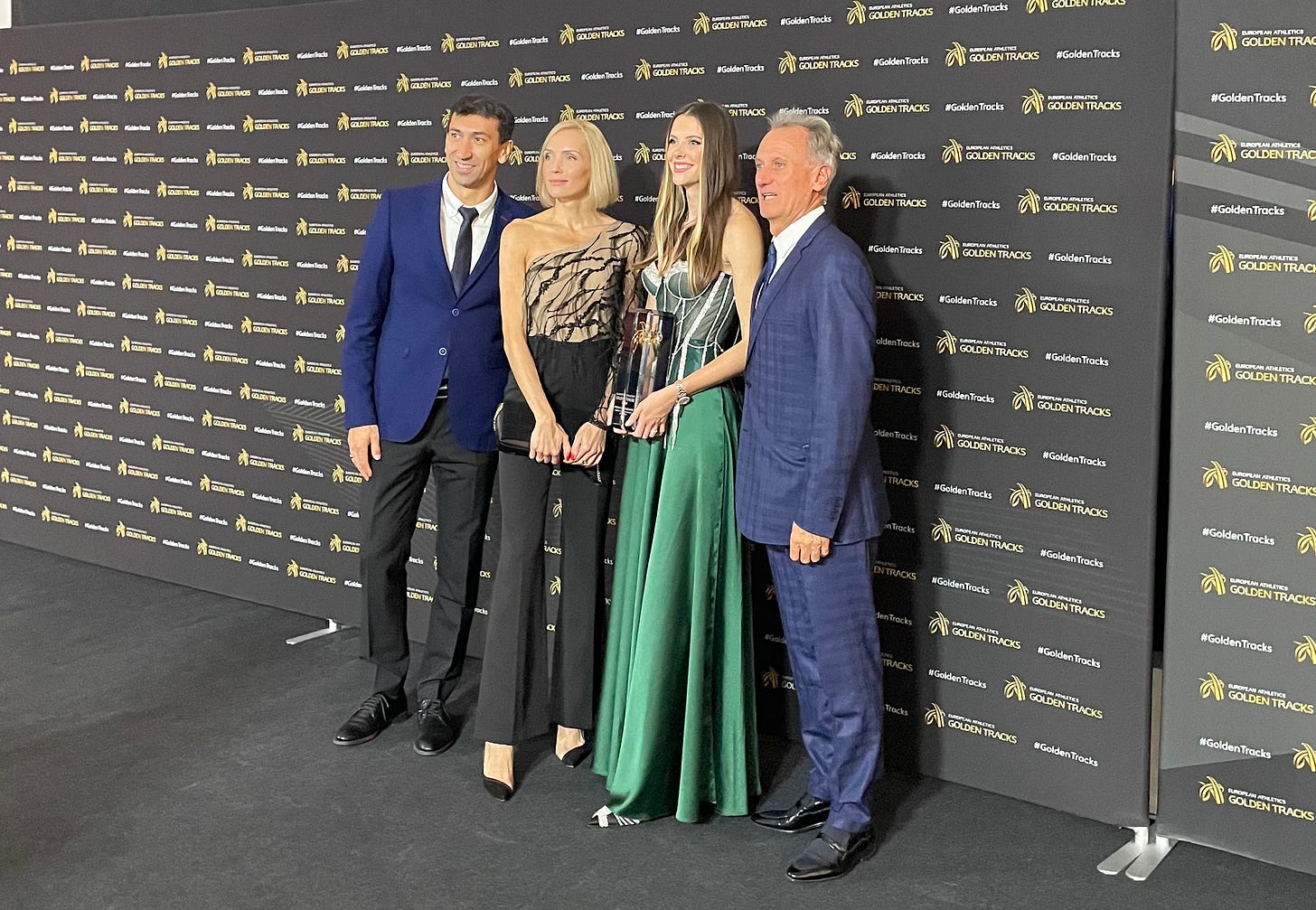
Mondo Duplantis couldn’t make it, but Yaroslava Mahuchikh was there in person to collect the European Female Athlete of the Year award. Meanwhile, Dragutin Topic and Djerdji Vilagoš of Serbia each took coaching awards for their work with stables of great athletes, including their own (now world-class) kids.
Dragutin, who set a junior world record of 2.37 in his day, had remarked to me in 2017: “Watch my daughter Angelina, I know dads are biased, but I think she’s going to be pretty good.”
We’ll be back to our regularly scheduled programming next week, with more on OpenTrack developments and improvements.
For now, as always, if you have any feedback, requests, or want help bringing your athletics into the 21st century, feel free to get in touch at info@opentrack.run.
Yugoslavia bought a lot of them from London in the 1950s to equip the city; they have now been replaced with modern ones made by a Chinese company, but with British engines


